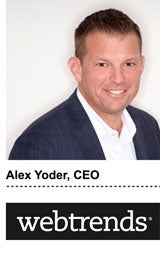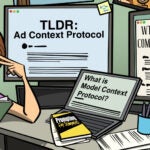 For advertisers, the stakes for capturing and leveraging data are higher than ever, placing analytics firms high in demand. Few web and mobile analytics firms have been around as long as Webtrends, which is about to celebrate its twentieth birthday.
For advertisers, the stakes for capturing and leveraging data are higher than ever, placing analytics firms high in demand. Few web and mobile analytics firms have been around as long as Webtrends, which is about to celebrate its twentieth birthday.
AdExchanger sat down with CEO Alex Yoder to talk about the Portland, Ore.-based company’s growth, Mozilla’s browser experiment and predictive analytics.
AdExchanger: Given that measuring mobile advertising is still a gray area for many companies, what’s your approach to mobile measurement?
ALEX YODER: I don’t think there’s a single answer to the question. It is and will continue to be a fragmented ecosystem. In large part, that’s because there are individual entities that are competing for control. You have operating systems providers, device manufacturers, app managers and other players. The focus that we’re taking, the one we think is most safe and the most economically advantageous play, is to stick with the brands. What I mean is our entire business model is focused on representing the brands’ domains and their other properties like mobile websites, mobile apps, etc.
If they own it, we collect and structure the data. We don’t drop third-party cookies and follow you wherever you go. We don’t try to scrape data from the provider. Some of those other methods are coming under a lot more scrutiny from a privacy perspective.
What are your thoughts on Mozilla’s experiment in which they’re creating a central repository of customer data on their browser?
I think the theme is right, but I don’t know if their execution is going to be successful. There’s an impetus for the consumer to control more of it [the ads they receive] and I think the consumer will have more control, but not through a browser like Mozilla. Ultimately, I think what’s going to happen and we’ve already started to see it happen, is that brands will have to be more aware of engaging with consumers in a meaningful way that’s an exchange of value. It’s no longer about me, hammering you with coupons. It’s about me as a brand understanding all the facets in your lifestyle and trying to figure out how to communicate with you.
It’s all about getting the consumer to opt in to the experience. When you look at browsers, though, their reach is limited. What do you do with mobile devices and apps? Ultimately, I think what’s going to happen is that brands will have to be more aware of engaging with consumers in a meaningful way that’s an exchange of value, but there are a lot of challenges to Mozilla’s approach.
What about Facebook? What do they need to do to better use their data?
I think they need to start taking more seriously the idea that they’re an ad network and signing partnerships that can extend that. I think they’re making progress with their mobile advertising and as far as having a brand connected to the consumer, Facebook is the best platform positioned to make that happen.
Let’s say you run a campaign where you have a targeted ad on Facebook that says enter our contest to win Justin Bieber tickets. You target those people and people “like” your brand. When people like your brand, they get a popup that asks if you can send them similar offers. Those people have essentially just told Facebook to target them any time on behalf of this brand. So now Facebook is the central clearinghouse for the brand’s relationships with consumers.
And when you think about mobile, it can describe any device that doesn’t have a cord attached to it. Very soon we’re going to have universal Wi-Fi and mobile devices won’t just be a phone or a tablet. It could be your refrigerator or your car. For example, I believe this will soon be possible: I have a Samsung refrigerator that’s Wi-Fi enabled. If I walk into a grocery store, I could get a push notification from my fridge through Facebook that says your last Diet Coke is gone, here’s a coupon to buy two cases. Facebook could absolutely be the connection point for that. They have the data and the relationships with the brand to make that possible. To me that’s where their next opportunity is.
What other analytic solutions do you think Facebook is looking at? What holes do they need to fill in terms of their analytic abilities?
I think one of the areas that Google has done a great job at is expanding beyond their core channels. One of the limitations Facebook has is they don’t know if you really converted or not outside of their site. Google in offering all these free applications and has the ability to more effectively tie those experiences across their different channels and properties.
I think that’s the biggest difference between Google and Facebook. It’s because of the mindset of the companies. Google knows it’s an ad-serving company. They spend a lot of money in various areas, but they do it to make their data better. Facebook still has what seems like this philosophical idea where they say they’re an ad company but they also want to change the world.
What do you think about the Omnicom-Publicis merger? How significant is it to the ad tech space?
I think it’s an effort to make a difference but in the end, I think they’ll fail.
I think ultimately, the entity that will win is the one that will be able to say we have the scale of the technology platform plus the intelligence of the ad agency, and you only have to pay once. And I personally think it is easier for the tech companies to do this than it is for the agencies to add the tech capabilities. They do not have the DNA or the appetite to build or buy technology and continue to develop it in a meaningful way.
The other thing is brands are becoming more comfortable with creating and distributing their own content. To me, a natural next step is for them to become comfortable with building their own customer profiles. As a brand, I don’t want a DSP or an ad network to collect and aggregate all this information about my customers. I want to be able to do it myself.
I view the merger as a highly defensive move. They [Omnicom and Publicis] see the writing on the wall. It’s the continued consolidation of the industry for the sake of cutting costs. But I would say you don’t save your way to growth.
What’s your roadmap? What are you working on?
What we have today outside of our legacy analytics is streaming consumer behavioral information that we can use to retarget or target you within your current visit or past visits to a client’s site. We serve content that improves that experience. To be able to do that, we have some science layered on top of the data and we use SAP’s Hadoop [database] and some newer platforms. Our roadmap is focused on continuing to build out to scale centralized customer profile across different digital channels.
The biggest area of our push is focused on advancing the math and science. We have data depth and we have the insight of behavioral information. Now it’s about applying some of the predictive elements. This isn’t just about providing recommendations, but automating the interactions on an ongoing basis. We’re working on things like behavioral clustering where we’re creating predictive models on future outcomes. We have the data piece and the reporting piece and elements of the predictive piece but it’s still limited.
What can you say about your company’s revenue and growth?
We’re worth several hundred million and since I’ve been CEO [in 2008], we’ve successfully weaned ourselves off the on-premise license model. In fact, this year is the first year we’ve had zero license sales and our SaaS revenue has been increasing steadily. We’re pretty much at 100% recurring revenue now and continuing to grow at a steady rate.













